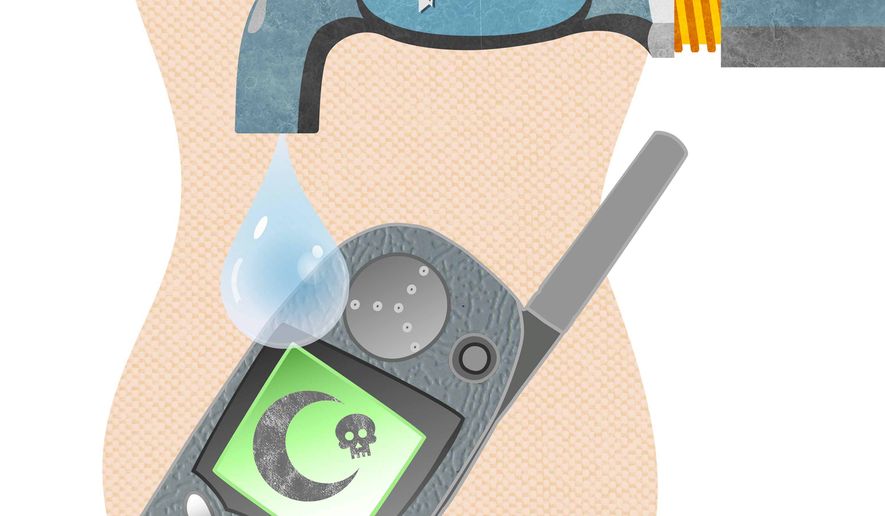OPINION:
When White House Press Secretary Sarah Sanders said media reports compromised the fact that the U.S. government was intercepting Osama bin Laden’s satellite phone calls, the media clobbered her.
“The media routinely reports on classified information and government secrets that put lives in danger and risk valuable national security tools,” Ms. Sanders said at a press briefing on Aug. 1. “One of the worst cases was the reporting on the U.S. ability to listen to Osama bin Laden’s satellite phone in the late ’90s. Because of that reporting, he stopped using that phone, and the country lost valuable intelligence.”
CNN tweeted that “Sarah Sanders falsely blamed journalists for thwarting U.S. spying on Osama bin Laden just years before the 9/11 terrorist attacks.”
Other outlets claimed that the story had been debunked years earlier or that the Taliban had leaked the story of the National Security Agency (NSA) intercepts two years before bin Laden stopped using his satellite phone. Headlines called Ms. Sanders’ claim an “urban myth,” a “zombie claim,” and a “lie.”
In fact, for my book “The Terrorist Watch,” CIA officials told me that the agency believes it was an Aug. 17, 1998, Washington Post story that triggered bin Laden’s decision to stop using his satellite phone. The Aug. 17 Post story cited a claim by Vincent Cannistraro, a former CIA counterterrorism official from the late 1980s, that the United States was intercepting the phone calls of bin Laden’s associates.
The article paraphrased Mr. Cannistraro as claiming that he was “aware of intercepted electronic communications among bin Laden associates in the aftermath of the embassy bombings in which they take credit for the attacks and exchange warm congratulations.”
In a subsequent letter to the editor, Mr. Cannistraro, without denying that he had made the claim, backpedaled on his own quote. “I do not have current access to intelligence collection techniques, nor am I aware of the specific nature of any intelligence information the U.S. intelligence community has on bin Laden’s alleged responsibility,” Mr. Cannistraro wrote.
Within a few days of the publication of Mr. Cannistraro’s claim, bin Laden and his people stopped using their phones. Based in part on the location of bin Laden’s phone, President Clinton ordered a Cruise missile attack on August 20 on an al Qaeda paramilitary training camp in Khost, Afghanistan and on the El Shifa pharmaceutical plant in Khartoum, Sudan’s capital. The attack killed 21 al Qaeda trainees from Pakistan but missed bin Laden.
Regardless of the strike, CIA officials told me for the book that the agency believed that bin Laden would have continued to use the phone if the intercepts had not been compromised.
Two days before The Washington Post ran Mr. Cannistraro’s claim, a Knight-Ridder story that appeared in nine local papers also quoted Mr. Cannistraro on the bombings. The story included unattributed quotes saying that “U.S. intelligence officials” reported that “an exhaustive review of electronic intercepts of traffic on bin Laden’s communications network has uncovered some evidence that bin Laden helped plan the attacks, along with some congratulatory messages after the August 7 bombings in Nairobi and Dar es Salaam.”
That statement was vaguer than the one in The Washington Post and appeared in papers such as the New Orleans Times-Picayune and the Dayton Daily News. As a result, the CIA did not consider it as significant a compromise. An on-the-record comment in The Washington Post by a former CIA counterterrorism official was an entirely different matter. The story was also available on the paper’s website.
Once the comments appeared, subsequent press stories speculated about whether NSA was intercepting bin Laden’s communications. Because those stories were not as specific or credible and appeared days after bin Laden stopped using the phone, as was the case with an Aug. 21, 1998 Washington Times story, they were not considered by the CIA to be significant.
In congressional testimony, NSA Director Michael V. Hayden described the compromise as a “setback of inestimable consequences in the war against terrorism when Osama bin Laden and his key lieutenants stopped using a phone following 1998 press reports of our intercepts.”
Mr. Cannistraro’s public statements years earlier calling the CIA a “dinosaur” and more recently a bureaucratic “mush factory” had not endeared him to his former colleagues. But the intelligence community never fingered him for compromising the bin Laden intercepts because any SIGINT information is highly classified and because intelligence officials as a rule do not want to call even more attention to the fact that NSA intercepts communications of terrorists. In addition, back in those days no one was eager to single out for criticism a powerful media outlet like The Washington Post.
Asked about his comments, Mr. Cannistraro told me he had no comment on the matter beyond his letter to the editor. But had The Washington Post not run the story, bin Laden’s location before he launched his 9/11 attack on the U.S. could have been pinpointed through his satellite phone, according to CIA officials. As a result, he might have been captured before 9/11. Moreover, NSA could have still been listening to his calls in the months before 9/11.
Thus, long before 9/11, in the most damaging way possible, the media was undercutting the government’s efforts to catch terrorists when no abuse or failure was involved. The media’s attack on Sarah Sanders’ accurate claim as determined by the CIA only confirms how irresponsible they have become.
• Ronald Kessler, a former Washington Post and Wall Street Journal investigative reporter, is the author of “The Trump White House: Changing the Rules of the Game” (Crown Forum).




Please read our comment policy before commenting.